|
|
|
Sort Order |
|
|
|
Items / Page
|
|
|
|
|
|
|
| Srl | Item |
| 1 |
ID:
178571


|
|
|
|
|
| Summary/Abstract |
The era of American leadership in the multilateral trading regime has ended. This paper argues that this current antipathy to trade is unsurprising: support for US leadership of the regime has always rested on a precarious balance among domestic interests. To overcome a historic bias in favor of home market production, American leaders created incentives for exporters to organize while creating roadblocks for import-competing firms and their employees. The dominance of the exporters’ voice had a significant influence on the policies the US pursued in the design and execution of the global trade regime. Most importantly, the absence of labor's voice undermined the prospect for “embedded liberalism” and instead resulted in an anemic system of adjustment for job loss at home and limited support for worker interests within the regime. While policymakers’ decision to shift power away from potential “veto” groups may have been necessary for US leadership of the Liberal International Order, this institutional design undermined a robust response to the economic dislocation thought to be a result of globalization. The result was a fracturing of the coalition in support of American leadership in the GATT/WTO regime.
|
|
|
|
|
|
|
|
|
|
|
|
|
|
|
|
| 2 |
ID:
106128


|
|
|
| 3 |
ID:
167520
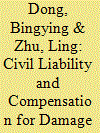

|
|
|
|
|
| Summary/Abstract |
The International Convention on Liability and Compensation for Damage in Connection with the Carriage of Hazardous and Noxious Substances by Sea (the HNS Convention) has not entered into force. In China, a two-tier compensation regime has been established for vessel-source oil pollution damage, but this regime does not address damage in connection with the carriage of HNS by sea. This article examines the Chinese law approach to civil liability and compensation for damage in this respect, and discusses whether there is an adequate framework in place to address issues that may arise.
|
|
|
|
|
|
|
|
|
|
|
|
|
|
|
|
| 4 |
ID:
083622


|
|
|
|
|
| Publication |
2008.
|
| Summary/Abstract |
Abstract: In 2001, two indigenous Orang Asli communities living in Peninsula Malaysia were forced to leave their homelands to make way for the Sungai Selangor dam. The dam, built to resolve water shortages in Kuala Lumpur, came with a comprehensive compensation package designed to alleviate the hardships faced by the displaced communities. This paper explores the discursive and material impacts of these compensation packages. We argue that the emerging literature on compensation for displaced people values the same sorts of economic and social criteria as the Malaysian government does in its pursuit of modernising the Orang Asli. Their shared belief that effective compensation would improve the quality of life for affected communities above pre-displacement levels helped to publicly legitimise the dam-building project. Interviews with the displaced communities, however, found stark differences in community satisfaction which have more to do with losses of intrinsic place-based cultural and spiritual values, for which there may be no effective or adequate compensation, than social and economic criteria. We conclude that compensation programmes will always struggle to effectively cope with these less tangible place-based values and that open acknowledgement of this weakness is required if alternatives to displacement-inducing development projects are to be more readily considered
|
|
|
|
|
|
|
|
|
|
|
|
|
|
|
|
| 5 |
ID:
084424


|
|
|
|
|
| Publication |
2008.
|
| Summary/Abstract |
Abstract: In 2001, two indigenous Orang Asli communities living in Peninsula Malaysia were forced to leave their homelands to make way for the Sungai Selangor dam. The dam, built to resolve water shortages in Kuala Lumpur, came with a comprehensive compensation package designed to alleviate the hardships faced by the displaced communities. This paper explores the discursive and material impacts of these compensation packages. We argue that the emerging literature on compensation for displaced people values the same sorts of economic and social criteria as the Malaysian government does in its pursuit of modernising the Orang Asli. Their shared belief that effective compensation would improve the quality of life for affected communities above pre-displacement levels helped to publicly legitimise the dam-building project. Interviews with the displaced communities, however, found stark differences in community satisfaction which have more to do with losses of intrinsic place-based cultural and spiritual values, for which there may be no effective or adequate compensation, than social and economic criteria. We conclude that compensation programmes will always struggle to effectively cope with these less tangible place-based values and that open acknowledgement of this weakness is required if alternatives to displacement-inducing development projects are to be more readily considered.
|
|
|
|
|
|
|
|
|
|
|
|
|
|
|
|
| 6 |
ID:
117898
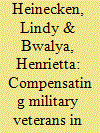

|
|
|
|
|
| Publication |
2013.
|
| Summary/Abstract |
This article outlines the widespread needs of South African military veterans and the possible consequences if the promises made in the recent Military Veterans Act are not met. The first part of the article defines who generally qualifies as a military veteran, how they are typically compensated in various countries with specific reference to neighbouring southern African countries, and what the consequences are when veterans become disenchanted with the state. The second part focuses on South Africa and the recent debates on military veterans and their entitlements. With reference to the findings of a qualitative study conducted among military veterans, parliamentary debates and media reports, an assessment is made of the demands and affordability of promised benefits and the consequences should the state not deliver. The conclusion is reached that heightened expectations are presently frustrated by slow roll-outs, and this is likely to increase the possibility of protest action. This has now the potential to create further tension within the ruling party and civil society, as the pressure on public finances mounts and demands become unsustainable. The effect this may have on political stability will depend on how the government manages this issue.
|
|
|
|
|
|
|
|
|
|
|
|
|
|
|
|
| 7 |
ID:
118012


|
|
|
|
|
| Publication |
2013.
|
| Summary/Abstract |
China has made great efforts to establish a compensation system for oil pollution damage from ships. Several laws and regulations have come into effect since 2010 that have brought significant changes to the legal regime of compensation for oil pollution damage. In this article, the new legal regime for compensation for oil pollution damage from ships is examined to illustrate how China is moving closer to the international standard in this area.
|
|
|
|
|
|
|
|
|
|
|
|
|
|
|
|
| 8 |
ID:
160440
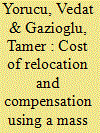

|
|
|
|
|
| Summary/Abstract |
There have been many discussions about property disputes between Turkish and Greek Cypriots since 1963, when Turkish Cypriots were ousted from the administration of the Republic of Cyprus. Representatives of Turkish Cypriots and Greek Cypriots have been negotiating to find a lasting solution to the ‘Cyprus Problem’ since 1968. One of the main issues of the negotiations is how to find a solution in a bi-zonal federation to the property problem, which started in 1964 for the Turkish Cypriots and 1974 for the Greek Cypriots. Any kind of comprehensive settlement plan would include restitution, exchange, and compensation to resolve property disputes. Therefore, prior to any solution, this study aims to contribute to estimating the cost of compensation of properties through a mass valuation methodology. The study also investigates the cost of relocation of dispossessed owners and current users due to reinstatement. The study demonstrates, in various analyses, the amount needed for compensation of properties that would be left in the South and in the North by Turkish and Greek Cypriot owners, respectively.
|
|
|
|
|
|
|
|
|
|
|
|
|
|
|
|
| 9 |
ID:
172430
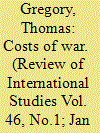

|
|
|
|
|
| Summary/Abstract |
Coalition forces have spent upwards of $50 million on condolence payments to Afghan and Iraqi civilians. These condolence payments were intended as an expression of sympathy rather than an admission of fault, and the programme itself has been criticised for the arbitrary, inconsistent, and low valuation of civilian lives. Rather than focus on the practical problems associated with condolence payments or normative arguments about whether belligerents ought to compensate those harmed, this article will trace the strategic imperatives that underpinned this programme and shaped its development. As coalition forces began to recognise the strategic costs of civilian casualties, they used a variety of tactics to mitigate the effects of civilian casualties on the success of military operations. This article will argue that condolence payments should not be seen as a humanitarian gesture designed to recognise and respond to the suffering of ordinary civilians, but will argue that condolence payments should be viewed as a weapons system aimed at securing specific military goals. As such, this article will argue that condolence payments continued to objectify and devalue the lives of Afghans and Iraqis by treating them as a means to an end rather than an end in themselves.
|
|
|
|
|
|
|
|
|
|
|
|
|
|
|
|
| 10 |
ID:
099611
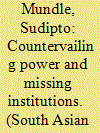

|
|
|
|
|
| Publication |
2010.
|
| Summary/Abstract |
Providing resource security for one group of stakeholders frequently entails loss of a certain degree of resource security for another group of stakeholders. The competing interests of winners and losers, and the 'public good' nature of many resource uses, makes it challenging to provide resource security in a benign and equitable manner. Power relations are key in determining compensation outcomes, and in particular the importance of countervailing power, in the absence of autonomous institutions with regulatory authority. When one group has overwhelming market power, or political power or a combination of the two, that group's interest will drive the outcome, regardless of the technical principles of compensation. The article demonstrates through examples how the dynamics of countervailing power works in the national context and in the global context. It also highlights the usefulness of autonomous institutions with jurisdiction over resource security issues. Institutions can protect the interest of stakeholders who do not have either economic power or political power.
|
|
|
|
|
|
|
|
|
|
|
|
|
|
|
|
| 11 |
ID:
171503
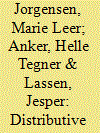

|
|
|
|
|
| Summary/Abstract |
To address increasing opposition to wind projects in Denmark three compensation schemes were introduced in the 2008 Renewable Energy Act. The aim was to address issues of distributive fairness and thereby to increase local acceptance. This paper analyses the role of two individual compensation schemes – the property value-loss scheme and the co-ownership scheme – on local citizens’ perceptions of fair distribution of the benefits and burdens of wind energy projects. The qualitative case study of three Danish wind energy projects discloses that distributive unfairness was a prevalent concern among local citizens, and that this concern was inseparable from perceptions of procedural fairness and recognition. The key conclusion is that the two compensation schemes are not successfully offsetting perceptions of unfair distribution. The schemes are challenged by a multitude of intertwined concerns. The compensation schemes are not equipped to address the plethora of non-monetary values affected by the wind projects. Specifically the compensation schemes are criticised for not offering adequate local benefits or distribution thereof, equal access, fair procedures and transparency. In fact the schemes were by some considered unfair and created perceptions of lack of recognition and bribery which undermined their role in promoting distributive fairness and local acceptance.
|
|
|
|
|
|
|
|
|
|
|
|
|
|
|
|
| 12 |
ID:
152500


|
|
|
|
|
| Summary/Abstract |
Trade adjustment assistance (TAA) is government aid to those affected by trade agreements. We review the history of TAA in Canada and ask whether Canada needs to reintroduce it in response to the recent intensification of trade negotiations. In light of the compensation offered by the federal government in connection with the Canada–European Union Comprehensive Economic and Trade Agreement (CETA), we examine how TAA fits in with the evolution of Canadian federalism in the trade policy area. Based in part on interviews with provincial trade negotiators, we conclude, first, that the compensation is an outcome of Canadian federalism. Second, we argue that while there is no reason to reintroduce a federal TAA program for workers, compensation for provinces is necessary to facilitate their cooperation with the implementation of trade treaty provisions. Third, we suggest that a more transparent rationale for such compensation would be superior to the ad hoc compensation observed in CETA.
|
|
|
|
|
|
|
|
|
|
|
|
|
|
|
|
| 13 |
ID:
187866
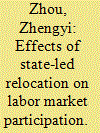

|
|
|
|
|
| Summary/Abstract |
The urbanization of China has been accompanied by large-scale state-led relocation (SLR) programs. This paper studies the effects of urban SLR on labor market participation. With three waves of China Household Finance Survey (CHFS), we find that urban SLR reduces labor market participation, on both the extensive margin and the intensive margin. The reduction is stronger for females, and there is some substitute effect between husbands and wives. The reduction is also stronger for individuals who are elder and less educated, and who choose lump sums of monetary compensation. Finally, we find no evidence that urban SLR experience stimulates business creation.
|
|
|
|
|
|
|
|
|
|
|
|
|
|
|
|
| 14 |
ID:
128345
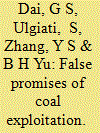

|
|
|
|
|
| Publication |
2014.
|
| Summary/Abstract |
The grasslands of Inner Mongolia are not only the source of the necessary resources for the survival and development of herdsmen, but also represent a significant green ecological barrier in North China. Coal-mining production is important in maintaining GDP growth in Inner Mongolia. However, over-exploitation has created serious problems, such as pollution of the environment and significant decreases in grassland ecosystem services, in addition to impacting the well-being of herdsmen and other humans. Based on questionnaires survey performed among 864 herdsmen addressing the relationship between coal exploitation in grasslands and human well-being in Xilinguole League in Inner Mongolia, we found that (1) coal resource exploitation in these grasslands does not benefit the herdsmen by increasing their income; (2) the rapid development of this resource has not obviously materially improved the life of the herdsmen; and (3) these activities have increased the risks that herdsman will have to endure in the future. Overall, coal resource exploitation in grasslands has more negative than positive effects on the well-being of herdsmen. We propose the conservation of coal resources and improvement of ecological compensation should be carried out without blindly pursuing economic growth, instead of focusing on economic development and structural adjustments.
|
|
|
|
|
|
|
|
|
|
|
|
|
|
|
|
| 15 |
ID:
192725


|
|
|
|
|
| Summary/Abstract |
What are fossil fuel communities’ preferences over the design of just transition assistance accompanying climate policy? This study conducted survey experiments at Appalachian county fairs to answer this question, overcoming barriers that have limited previous attempts to measure preferences in these crucial regions. Comparing the responses to a new national survey, there is a divergence in preferences for policies encouraging relocation, but there is convergence behind support for policies that reduce costs to fossil fuel workers. The study also finds that an intervention to provide information about coal’s decline shifted preferences toward supporting the clean energy transition. Rather than public opinion being an immutable barrier to climate action, 66% of fossil fuel community residents would endorse climate policy if it were coupled with just transition assistance. Policy design and informational interventions could help to create climate coalitions, even in the places most affected by the clean energy transition.
|
|
|
|
|
|
|
|
|
|
|
|
|
|
|
|
| 16 |
ID:
141459


|
|
|
|
|
| Summary/Abstract |
As part of the counterinsurgency initiatives in Afghanistan and Iraq, military forces have been making payments to civilians in cases of ‘inadvertent’ injury, death and/or damage to property. There are no legal norms governing civilian compensation in war. Rather, military payments are seen as a way to help ‘win’ the hearts and minds of the population. This article examines this turn to military payments, with a focus on US practices and the implications for our understanding of contemporary changes to warfare. I suggest that while monetary payments can alleviate short-term economic need, the lack of legal liability is problematic as it may help amplify the impunity of warring soldiers. The article begins with an overview of the bureaucratic ways in which monetary values are attributed to death and injury. It then turns to consider how military payments reinforce the notion of ‘collateral damage’ that is legitimized in international humanitarian law. Finally, I draw upon theories of the gift, and of the gift of war, to interrogate the affective register in which military payments are made, inserted as they are in narratives of sympathy and condolence that bind the giver and receiver in relations of indebtedness and dependence.
|
|
|
|
|
|
|
|
|
|
|
|
|
|
|
|
| 17 |
ID:
141778
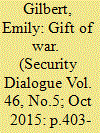

|
|
|
|
|
| Summary/Abstract |
As part of the counterinsurgency initiatives in Afghanistan and Iraq, military forces have been making payments to civilians in cases of ‘inadvertent’ injury, death and/or damage to property. There are no legal norms governing civilian compensation in war. Rather, military payments are seen as a way to help ‘win’ the hearts and minds of the population. This article examines this turn to military payments, with a focus on US practices and the implications for our understanding of contemporary changes to warfare. I suggest that while monetary payments can alleviate short-term economic need, the lack of legal liability is problematic as it may help amplify the impunity of warring soldiers. The article begins with an overview of the bureaucratic ways in which monetary values are attributed to death and injury. It then turns to consider how military payments reinforce the notion of ‘collateral damage’ that is legitimized in international humanitarian law. Finally, I draw upon theories of the gift, and of the gift of war, to interrogate the affective register in which military payments are made, inserted as they are in narratives of sympathy and condolence that bind the giver and receiver in relations of indebtedness and dependence.
|
|
|
|
|
|
|
|
|
|
|
|
|
|
|
|
| 18 |
ID:
059272


|
|
|
| 19 |
ID:
174797


|
|
|
|
|
| Summary/Abstract |
This paper looks at the history of state-making in an entangled imperial frontier. The northeastern frontier of British India was a mosaic of princely states, administered and un-administered territories. The presence of the colonial state in the region was contentious, marked by violence on one hand and philanthropy on the other. The Japanese invasion of the region during World War Two had several unintended ramifications. Wartime and post-war developments produced institutions and social experiences which facilitated the process of state-making in the region. Relief and Rehabilitation project of the colonial state, and later distribution of monetary compensation was not merely governed by moral or legal obligations but was part of a larger project of imperialist reconquest in Asia after the surrender of the Japanese with Manipur and Naga Hills as the base. This project also provided the postcolonial Indian state with institutions to continue the process of state-making of its own.
|
|
|
|
|
|
|
|
|
|
|
|
|
|
|
|
| 20 |
ID:
121108


|
|
|
|
|
| Publication |
2013.
|
| Summary/Abstract |
This paper presents the experiences of 22 displaced families and their battle for water access based on a pilot survey of Manesar, in the northern Indian state of Haryana. Interviews were conducted in the summer of 2011 to examine a water regime recently transformed by compulsory land acquisition and displacement in one of India's driest and fastest growing areas. This dimension of the land acquisition and displacement narrative is a response to the crisis over resource access and control in peri-urban India where a burgeoning demand for land, water, and capital has sparked contentious debates over fairness and equity. Despite recent amendments to the Land Acquisition Act of 1894, long-standing questions regarding compensation and rehabilitation for drinking water services remain unanswered. The findings of this paper show that there may be limits to halting the effects of land displacement altogether without aggressive legislation capping water grabs, or a radical shift in the way in which water is valued and redistributed to the landless. Conventional alternatives to fulfilling drinking water needs, designed by and for the less poor, such as bottled water, private water tankers, water permit systems, or even land redistribution are likely to exacerbate already limited access, rather than improve it. A number of mitigation techniques are explored, including those inherent to common property resources (CPR), which may ensure access to safe drinking water is maintained.
|
|
|
|
|
|
|
|
|
|
|
|
|
|
|
|
|
|
|
|
|